高中英语人教版必修三第三单元Unit3_Reading
- 格式:ppt
- 大小:1.16 MB
- 文档页数:20
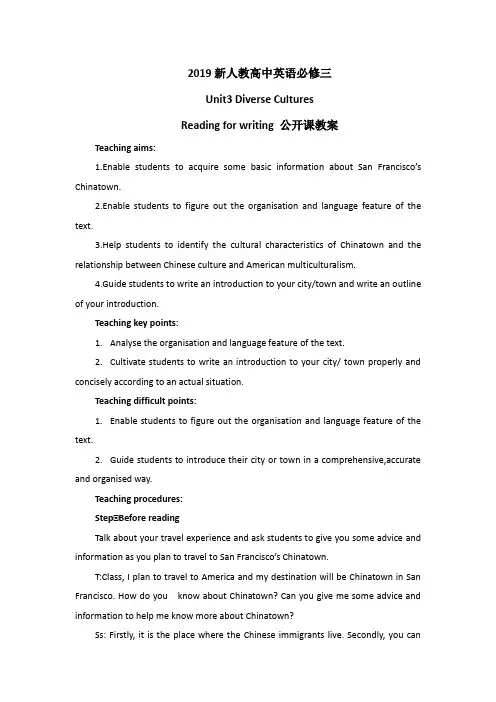
2019新人教高中英语必修三Unit3 Diverse CulturesReading for writing 公开课教案Teaching aims:1.Enable students to acquire some basic information about San Francisco’s Chinatown.2.Enable students to figure out the organisation and language feature of the text.3.Help students to identify the cultural characteristics of Chinatown and the relationship between Chinese culture and American multiculturalism.4.Guide students to write an introduction to your city/town and write an outline of your introduction.Teaching key points:1.Analyse the organisation and language feature of the text.2.Cultivate students to write an introduction to your city/ town properly and concisely according to an actual situation.Teaching difficult points:1.Enable students to figure out the organisation and language feature of the text.2.Guide students to introduce their city or town in a comprehensive,accurate and organised way.Teaching procedures:StepⅠBefore readingTalk about your travel experience and ask students to give you some advice and information as you plan to travel to San Francisco’s Chinatown.T:Class, I plan to travel to America and my destination will be Chinatown in San Francisco. How do you know about Chinatown? Can you give me some advice and information to help me know more about Chinatown?Ss: Firstly, it is the place where the Chinese immigrants live. Secondly, you canexplore the interesting sights,experience traditional Chinese culture, go shopping, eat Chinese food, and so on.Step ⅠWhile readingCultural NoteThe Dragon Gate is the most photographed site in San Francisco’s Chinatown.The gate was designed by three Chinese-American architects in 1967 using traditional Chinese village gates for inspiration.The Tin How Temple is the oldest Taoist temple in Chinatown,and one of the oldest Chinese temples in the United States.The temple was built in 1852,but then destroyed by the 1906 earthquake.The image of the goddess Mazu was preserved,as well as part of the altar and the bell.These were relocated to the top floor of a building constructed on the site of the old temple.The Bank of Canton is actually the old Chinese Telephone Exchange,a traditional Chinese-style building constructed in 1894.When the telephone was first introduced,there was no way to dial a number.Instead,you would have to talk to a switchboard operator (nearly always a woman),tell her the telephone number of the person you wanted to talk to,and she would manually connect you to the person you wanted to call using an electric plug.However,Chinese residents thought it was impolite to use a number to refer to a person,so the switchboard operators in Chinatown had to know all the names and addresses of everyone in Chinatown so they would know who to connect people to.They also had to know five dialects of Chinese and speak English.Like many buildings in Chinatown,the Chinese Telephone Exchange was destroyed by the 1906 earthquake,but it was quickly rebuilt.However,in 1949 it was closed when dial telephones made switchboards unnecessary.Portsmouth Square,now a public park,is the site of San Francisco’s first public square,built in the early 19th century.While many important historical events related to California and San Francisco occurred in the square before Chinatown was established or grew in size,the site is now very much considered an integral part of Chinatown.The Scottish novelist Robert Louis Stevenson (1850—1894) lived in San Francisco briefly between 1879—1880,and spent much time in Portsmouth Square during his stay there.There is a monument in his honour in the park.Activity 1Prediction1.Look at the title and picture and predict what kind of article is this?2.Who are the target readers?3.What is the writer’s purpose of writing this text?Suggested answers:1.This is an introduction to Chinatown in San Francisco.2.Visitors.3.To introduce a diverse cultural Chinatown in San Francisco to visitors.Activity 2 Reading for main ideaRead the text quickly and match the main idea of the passage.Para.1 A.The characteristic of Chinatown.Para.2 B.The history of Chinatown.Para.3 C.The introduction of Chinatown’s shops and products.Para.4 D.The origin of Chinatown.Para.5 E.The existence value of Chinatown.Para.6 F.The famous food and drinks of Chinatown.Suggested answers:Para.1:A Para.2:D Para.3:B Para.4:C Para.5:F Para.6:EActivity 3 Reading for detailsRead the passage again and answer the questions.1.What are the famous tourist sites in the Chinatown of San Francisco?2.Which is the best season to visit the Chinatown in San Francisco?3.What else can you do there?Suggested answers:1.Dragon Gate,Tin How Temple,Bank of Canton,and Portsmouth Square.2.All year round.3.We can explore the interesting sights,experience traditional Chinese culture,goshopping,eat Chinese food,and so on.Activity 4Reading for organisation and language featuresRead the text again and study the organisation and language feature.1.What information is included in the introduction? Tick the items that are mentioned.2.Underline the sentences that are used to describe the items above.Location:______________________Climate:________________________________History:_____________________________________Ethnic groups:____________________________________Languages:_____________________________________________Famous figures:_____________________________________________Famous food/drink:_______________________________________________ Tourist attractions:_________________________________________________ Businesses and industries:_____________________________________________3.Fill in the blanks to show the structure of the text.Paragraph(s)Main ideaDetails Expressions1 Introductionsh ortintrodu ction to San Francisc o’s Chinato wn2—5 Bodywhat youcan findand doin San Francisco’sChina-town23456 Summaryim portanc e of Chinato wnSuggested answers: 1.2.Location:in San FranciscoClimate:mild all year roundHistory:Chinese immigrants settled in the area during the railroad construction and gold rush periodEthnic groups:the majority of residents in Chinatown are still ethnic ChineseLanguages:many of whom do not speak English fluentlyFamous figures:Robert LouisFamous food/drink:traditional dishes from all over ChinaTourist attractions:Dragon Gate,Tin How Temple,Bank of Canton,Portsmouth SquareBusinesses and industries:souvenirs,goods,and clothing;all kinds of traditional Chinese herbal medicine;Chinese tea stores3.Pa ragraph (s)MainideaDetails Expressions1Int roducti onshortintroduction toSanFrancisco’sChinatownlocation,features,climatebiggest,oldest,very popular tourist draw,mild allyear round2—5what you2history,ethnichistorically...what started as...then turnedinto...the majority of residents...a real taste of ChinaBo dy canfindand doin SanFrancisco’sChinatowngroups,language3attractions,famous figuresfamous sites include....to name but a few,spendhours just exploring the interesting sights,smells,andsounds of China,a key site.a great place to...4storesand goodsoffer a unique range of...all kinds of...can befound,varieties of5foodtreasure,suit everyone’s taste,traditional dishesfrom all over China6 Summa ryimportance ofChinatownuniquecultureallow...to...experience...first handStepⅠ Describing a place with distinctive cultural identity1.In groups,brainstorm as much information as possible about your city/town and its culture.Then write an outline of your introduction.①What is unique about your city/town?②Is it a city/town with diverse cultures?③What examples can you give to illustrate its feature?2.Write an introduction to your city/town.The following phrases and expressions may help you.·is located in/on·has a history of...years·is divided up into·has a population of·is...in size·is home to...ethnic groups·the most popular/greatest/largest·popular festivals/foods/tourist sights include...Suggested answers:1.①My city is distinctive cultural identity.②Yes,it is a city/town with diverse cultures.③I will give examples such as history,population...to illustrate its features.2.Lijiang is an ancient city high up in the mountains of Yunnan,near the borders of Sichuan and Tibet.It was an important stop on the Ancient Tea and Horse Road,which connected central China with Myanmar and India,transporting not just tea but also silk and other goods.Lijiang’s Old Town,with a history of over 800 years,is a UNESCO World Heritage Site.Today,Lijiang is mostly known for its ethnic minority culture,especially the culture of the Naxi ethnic group.The Naxi are famous for their Dongba culture.They have their own unique written language that uses pictures and symbols.They also create beautiful arts and crafts,and are well known for their singing and dancing.Strolling around the Old Town,one can witness Naxi life much as it was hundreds of years ago.One can also try traditional Naxi food,including the air-dried pork liver,Naxi baba (a kind of flat bread),and Naxi hot pot.But if you really want to see Naxi traditional culture,it is best to visit during the Torch Festival,which usually occurs in the summer.During the festival,the streets are full of torches,bonfires,and lots of people singing and dancing.While the main ethnic group living in the area is the Naxi,there are also at least 19 other ethnic groups,including Yi,Lisu,Bai,Tibetan,and Pumi.It is easy to arrange a short homestay with an ethnic minority family to learn more about their way of life.Just outside the city,there are beautiful mountains,meadows,lakes,rivers,and gorges,offering plenty of opportunities to go hiking,kayaking,or rafting.Like much of Yunnan,the weather is always fairly mild in Lijiang,so it is fine to visit throughout the year.Lijiang can be easily reached by airplane or train,and visitors can hire bikes or cars to explore the area.It is the perfect place for tourists to experience the colourful culture of China’s ethnic minorities.StepⅠEvaluating and polishing the draft1.Exchange drafts with a e the checklist to give feedback on your partner’s draft.2.Get your draft back and revise it.3.Put up your introduction in your classroom or share it with the class.StepⅠHomework书面表达:请阅读下面有关中国题材纪录片(documentary)的对话,并按照要求用英语写一篇150个词左右的文章。
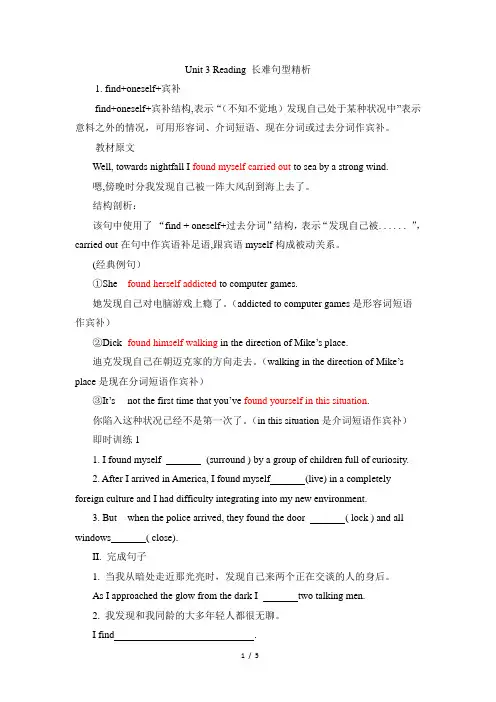
Unit 3 Reading 长难句型精析1. find+oneself+宾补find+oneself+宾补结构,表示“(不知不觉地)发现自己处于某种状况中”表示意料之外的情况,可用形容词、介词短语、现在分词或过去分词作宾补。
教材原文Well, towards nightfall I found myself carried out to sea by a strong wind.嗯,傍晚时分我发现自己被一阵大风刮到海上去了。
结构剖析:该句中使用了“find + oneself+过去分词”结构,表示“发现自己被. . . . . . ”,carried out在句中作宾语补足语,跟宾语myself构成被动关系。
(经典例句)①She found herself addicted to computer games.她发现自己对电脑游戏上瘾了。
(addicted to computer games是形容词短语作宾补)②Dick found himself walking in the direction of Mike’s place.迪克发现自己在朝迈克家的方向走去。
(walking in the direction of Mike’s place是现在分词短语作宾补)③It’s not the first time that you’ve found yourself in this situation.你陷入这种状况已经不是第一次了。
(in this situation是介词短语作宾补)即时训练11. I found myself (surround ) by a group of children full of curiosity.2. After I arrived in America, I found myself (live) in a completely foreign culture and I had difficulty integrating into my new environment.3. But when the police arrived, they found the door ( lock ) and all windows ( close).II. 完成句子1. 当我从暗处走近那光亮时,发现自己来两个正在交谈的人的身后。
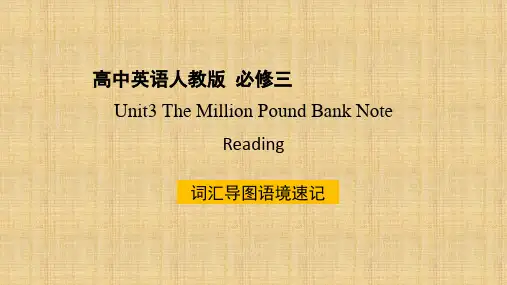



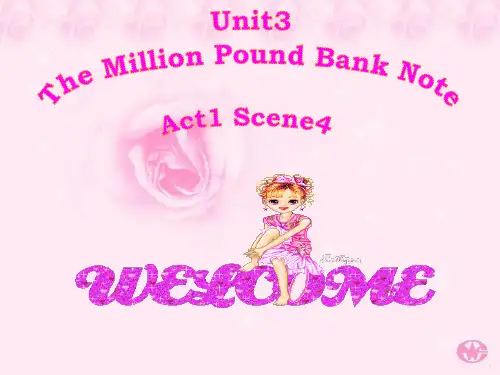

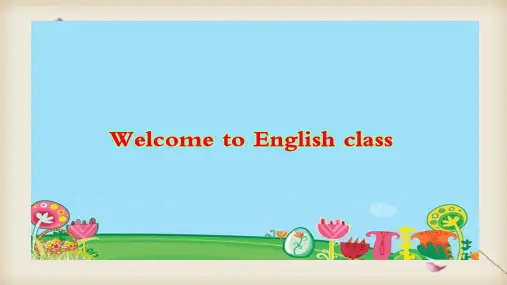
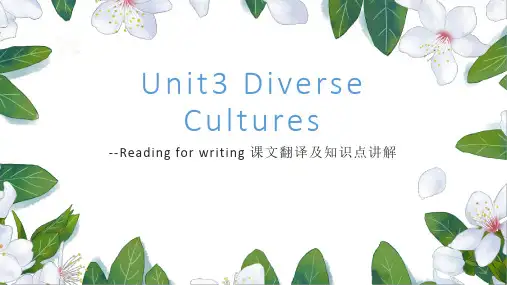
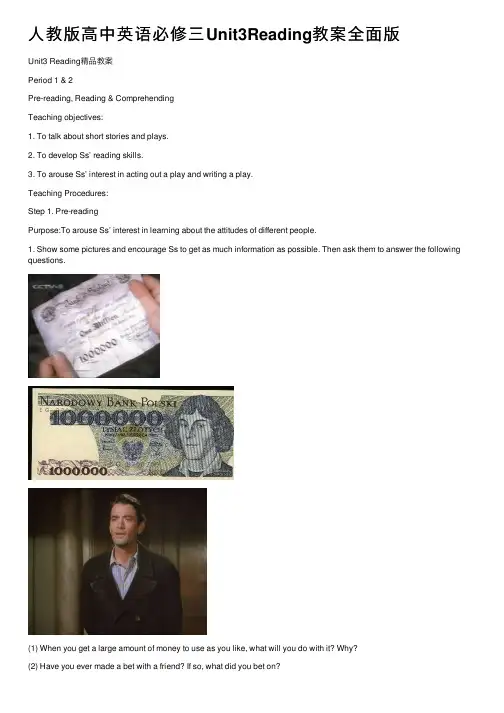
⼈教版⾼中英语必修三Unit3Reading教案全⾯版Unit3 Reading精品教案Period 1 & 2Pre-reading, Reading & ComprehendingTeaching objectives:1. To talk about short stories and plays.2. To develop Ss’ reading skills.3. To arouse Ss’ interest in acting out a play and writing a play.Teaching Procedures:Step 1. Pre-readingPurpose:To arouse Ss’ interest in learning about the attitudes of different people.1. Show some pictures and encourage Ss to get as much information as possible. Then ask them to answer the following questions.(1) When you get a large amount of money to use as you like, what will you do with it? Why?(2) Have you ever made a bet with a friend? If so, what did you bet on?(3) How did you feel about the bet after it was won or lost?(4) Have you ever rea d the story “The Million Pound Bank-Note”?(5) Have you seen the movie? If so, what did you think of it?2. Get Ss to talk freely with their partners about the value and use of money. After talking, ask Ss to present their opinions in class.For Your Reference:S1: I’ll buy a big house, a new car of my own and get married to a beautiful girl. In my opinion, the most important thing for a person is to enjoy the life. So, if I have a lot of money, I’ll make full use of it to meet my needs for a rich life. S2: I’ll give some money of the one million pound to the poor people in the western part of our country to help them live a happy life, especially the children.Because they really need help and they can learn more knowledge in order to develop the western part of our country. This way of spending money ismeaningful.S3: ...Step 2. Leading-inPurpose:To stimulate Ss’ interest in reading the text.Ask Ss to think about the following questions and talk about the answers.1. How did Henry get the Million Pound Bank-Note?2. Do you agree that the money can bring Henry happiness?3. What will Henry do with the note?4. How many characters are there in this scene?5. When and where did the story happen?Step 3. Fast readingPurpose: To get the gist of the passage.1. Ask Ss to read the text quickly and try to get the main idea of the text.2. Ask Ss to finish the following exercises according to the text.(1) Which is the right order of the events according to the text?① Henry wandered in London streets.② About a month ago, Henry Adams was sailing out of the bay.③ The next morning he was spotted by a ship.④ Towards nightfall he found himself carried out to sea by a strong wind.⑤ On the ship he earned his passage by working as an unpaid hand.A. ①②③④⑤B. ②③④⑤①C. ②④③①⑤D. ②④③⑤①(2) What’s the servant’s name?A. RoderickB. HenryC. OliverD. James(3) Which of the following statements about Henry is NOT true?A. Henry comes from the USA.B. He worked for a mining company in America.C. He arrives in England as planned.D. He wants to find work in London.(4) Which of the following statements is NOT one of the reasons why the brothers decide to choose Henry?A. He is an American.B. He doesn’t have any money.C. He is a hard-working man.D. He is honest.(5) Why did the narrator say “you’re about to hear the most incredible tale”?A. Because Henry Adams survived at sea.B. Because Henry Adams earned his passage by working as an unpaid hand.C. Because Roderick and Oliver invited Henry to step in and asked him questions.D. Because Henry Adams, a tramp, was given some money for reasons unknown to him.(6) Why did the two brothers give Henry Adams an envelope?A. They wanted to play a trick on Henry.B. They had a pity on Henry.C. They made a bet.D. Henry was not an English man.(7) How did Henry Adams feel when he got an envelope from the brothers?A. sadB. happyC. astonishedD. He took it for granted.Suggested Answers:(1) D (2) D (3) C (4) C (5) D (6) C (7) CStep 4. Intensive readingPurpose: to get the students to learn the details of the text.1. Ask Ss to read the text again and finish Ex1 of Comprehending on P19.2. Ask Ss to talk in pairs and answer the following questions.(1) How did Henry Adams come to England?(2) Where did Henry work before? How much did he have?(3) What did the two gentlemen give Henry?(4) When can Henry open the letter?Suggested Answers:(1)It was the ship that brought him to England.(2)He worked for a mining company before and he had no money at all.(3)They gave him a letter.(4) He can’t open it until two o’clock.3. Ask Ss to read the text very carefully and finish the following table.Suggested Answers:(1) summer (2) 1903 (3) London (4) American businessman (5) lost (6) find a job (7) brothers (8) invited (9) questions (10) a million pound bank-note (11) bet4. Ask Ss to answer the following question and try to find out the relative sentences. What kind of person are the characters? Suggested Answers:◆ Henry Adams: He earns his passage by working on a ship to England. (proud)He arrived in England by accident after not sailing his boat well. (careless)He asks for a job not charity. (honest)◆ Roderick and Oliver: having servants and not worrying about giving a stranger amillion pound bank-note. (rich)prepared to bet one million pounds just for a bit of fun. (mischievous)They see that Henry is honest and proud. (good judges of character)5. Ask Ss to have a small discussion to draw a summary of the whole text. Suggested Answer:Henry, a San Francisco businessman is rescued at sea by a British ship that takes him to London where he finds himselfwithout money, friends or the hope of finding a good job. Hungry and alone, he walks on the streets of the city when unexpectedly he is asked to a large and grand house. Two rich brothers, Roderick and Oliver, have made a secret bet. Roderick believes that a man cannot survive in the city for a month with only a million pound bank-note in his possession but Oliver believes he can. The play takes us along on Henry’s misadventures with humor and surprise to discover who will win the bet.Step 5. Language point1. go ahead(1) 进⾏;发⽣The building of the new bridge will go ahead as planned. 新桥的建设将会按照计划进⾏。
基本信息内容人教版选择性必修三Unit 3EnvironmentProtection 标题Climate changerequires theworld’sattention年级高二课型阅读课文本分析本节课教学内容是选择性必修三Unit 3 Environmental Protection 的第一部分 Reading and thinking 部分,探讨的话题为环境保护,该主题语境是“人与自然”。
标题为Climate change requires the world’s attentio n,是一篇说明文,文本结构清晰,按照“现象-原因-危害-措施”的逻辑顺序展开,通过展示气候变暖的趋势和影响,分析气候变化的成因和警示气候变化的后果,号召全人类采取恰当行动,减少碳排放,应对全球变暖。
学情分析大多数学生英语水平较好,理解能力较强。
英语学习主动性较强,愿意进行小组合作学习。
少数学生基础薄弱。
学生整体合作意识强。
在课前学生调查中发现,大部分学生有较强的环境保护意识,对气候变暖也有所了解,只是还不太清楚如何在日常生活中尽自己所能保护环境。
学生的语言表达的逻辑性欠佳,因此帮助学生建立语言体系很重要。
教学目标语言能力 1.阅读文章,理解全球气候变暖的原因、危害以及各国政府和个人应该采取的措施,探究如何减少温室气体的排放,控制全球气候变暖的进程。
学习能力 1.能够厘清温室效应的因果关系,制作流程图和思维导图来表达该关系。
文化意识 1.能够理解并感悟个人在环境保护中的作用和意义。
2.能够理解环境问题是需要全球共同面对和携手解决的问题,有意识地培养人类命运共同体意识,节约地球资源,保护地球家园。
思维品质 1.能够根据数据图表分析气候变化的趋势,找到问题产生的源头与解决问题的对策。
2.能够发表个人对气候变暖及环境保护的看法。
教学重难点教学重点 1.引导学生运用思维导图梳理文章内容及结构。
2.启发鼓励学生改变生活方式,减少碳排放,提出改善性的意见和对策。
Unit3 Reading 题型拓展拔高训练Unit 3 The Million Pound Bank Note一、完形填空[2017河北衡水中学期中考试]When Walter Myers was growing up, he showed great interest in reading books. He would be the whole day 1 in books. Today, he is the author of more than 100 books, most of them 2 children.Myers was 3 in a black neighborhood. As a boy, he loved 4 people in his community. But he couldn’t find many books about the stories of 5 people. So he chose to write the stories that reflect the lives of kids. “Some kids feel abandoned (被遗弃的) or 6 ,” Myers says,“but they’ll7 a book of mine and find themselves or their families.”It takes lots of 8 to write as many books as Myers does, but he loves it. He gets up early in the morning, and then begins his 9 at home. Myers first writes a (n) 10 for every book, which he calls prewriting. He imagines what the story will be, writing down ideas in a notebook. To 11 enough action and dialogue for a good story, he comes up with thirty 12 . He writes a short description of each scene in his notebook. He also 13 pictures of real people and pins (用图打打住)them on his office walls to get ideas for characters. 14 he knows what the story will be and who the characters are, he begins to write the whole book. He 15 five pages a day on his computer.When Myers is not prewriting a book, he might be rewriting something he has already 16 Then he’ll send the story to his 17 . They may make suggestions for the story. After these final 18 are made, the book is published and 19 its way to bookstores and libraries.By t hat time, he’ll be in20 for his next book. “I want to do the best with my writing,” Myers says. “I don’t have a need to do anything else.”1. A. buried B. held C. trapped D. caught2. A. on B. for C. with D. to3. A. recognized B. accepted C. admitted D. raised4. A. observing B. describing C. greeting D. helping5. A. familiar B. regular C. ordinary D. normal6. A. shocked B. excited C. hopeless D. careless7. A. review B. buy C. pick up D. go over8. A. effort B. effect C. patience D. courage9. A. traveling B. wandering C. copying D. writing10. A. outline B. chapter C. comment D. story11. A. provide B. examine C. prove D. express12. A. methods B. ideas C. scenes D. figures13. A. puts down B. cuts out C. tears up D. breaks up14. A. Unless B. Until C. Before D. Once15. A. finishes B. achieves C. selects D. mails16. A. published B. completed C. printed D. planned17. A. editors B. friends C. audiences D. fans18. A. discoveries B. results C. changes D. decisions19. A. directs B. makes C. leads D. pushes20. A. return B. time C. exchange D. preparation二、阅读理解When I was 15, I announced to my English class that I was going to write and illustrate (给力口插图)my own books.“Don’t be silly. Only geniuses can become writers,” the English teacher said. “. . . and you are getting a D this semester.” I was so ashamed.That night I wrote a short sad poem and mailed it to the Capri’s Weekly newspaper. To my astonishment, they published it and sent me two dollars. I was a published and paid writer. They laughed again. But I had tasted success. I sold the first thing I’d ever written. That was more than any of them who had done.During the next two years I sold dozens of poems, letters, jokes and recipes. By the timeI graduated from high school, with a C minus average, I had scrapbooks filled with my published works. I never mentioned my writing to my teachers, friends or family again. They were simply dream killers.Later I married and had children. I began my first book while the children were still young. It took nine months. I chose a publisher at random (随机地)and put the manuscript (手稿)in an empty box I could find. The letter I attached read, “I wrote this book myself. I hope you like it. I also did the illustrations. Chapters 6 and 12 are my favorites. Thank you.” I mailed it without making a copy of the manuscript.A month later I received a contract and a request to start working on another book. Crying Wind, my book, became a bestseller and was translated into 15 languages and Braille and sold worldwide. My first book also became required reading in Native American schools in Canada.I’ve written eight books. Four have been published and three are still out with the publishers. One stinks (让人感觉糟糕).To all those who dream of writing, I’m shouting at you, “Yes, you can. Yes, you can. Don’t listen to them.”I don’t write right but I’ve beaten the odds. Writing is easy; it’s fun and anyone can do it. Of course, a little dumb luck doesn’t hurt.1. What does the underlined sentence in Paragraph 2 imply?A. The teacher reminded the author to work harder to realize her ambition.B. The teacher didn’t believe the author could be a writer.C. The teacher laughed at the author because she did poorly in any of her subjects.D. The teacher hoped that the author could make progress that semester.2. When the author mailed her first poem, she_______A. never expected it to be publishedB. believed it would be publishedC. knew her teacher would be proud of herD. hoped she would be a paid writer3. What can we learn from the text?A. The author chose a famous publisher to publish her first book.B. Seven of the books the author wrote sold well across the world.C. The author’s first book was well received in Canada.D. The author used to keep a copy of the manuscript before mailing it out.4. What does the author intend to tell us with the story?A. Writing is not as difficult as you might think.B. Being a writer needs good luck.C. It takes time and patience to be a writer.D. Don’t be afraid to have big ambitions.三、七选五[原创题]You’ve got the part,so you must be able to act! There are some classic acting strategies that you’ll need to nail down (确定)to wow the crowds. Are you ready for your first Oscar?Read over the play. Before you begin acting, at least read through a few scenes to get the feel of what the play is about. Figure out the genre, and who are the character 1 .Get into the character. Now that you know more about the character, get in their shoes. If you can, tell your friends about it, and practice having a conversation or doing things as if you were the character. Talk like they would, walk like they would, watch the shows they would, and do the things they would. 2 .3 Stand up, memorize a couple of lines and practice moving with them. If the play doesn’t tell you what actions to do, do what you think the character would do. You are now the character. If he would hold his head while screaming, do that! Do what needs to be done.Memorize your lines. 4 During practice, you want to make sure you work more on your acting than just reading off the book. If you are reading, your hands and eyes are occupied, so learn ahead of time.Act and Learn. Be confident, whatever your character is supposed to be. If you must,practice being in the character an hour before the show. 5 Unless it is a one-man show, listen to their input. They may have better ideas and even ways to improve your actions. Take this to heart. If you must, ask multiple people what you should do.A. Add actions.B. Practice as often as possible.C. In every situation, be your character.D. Don’t take in too much at the same time.E. Be sure you know your lines for that day.F. Try to understand the meaning of the play.G. Be sure your actions work well with your other members.参考答案:一、完形填空1. A解析:根据上文中的“he showed great interest in reading books”可知,Walter Myers对读书非常感兴趣,他常常整天埋头读书。